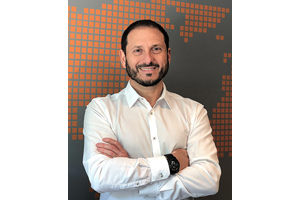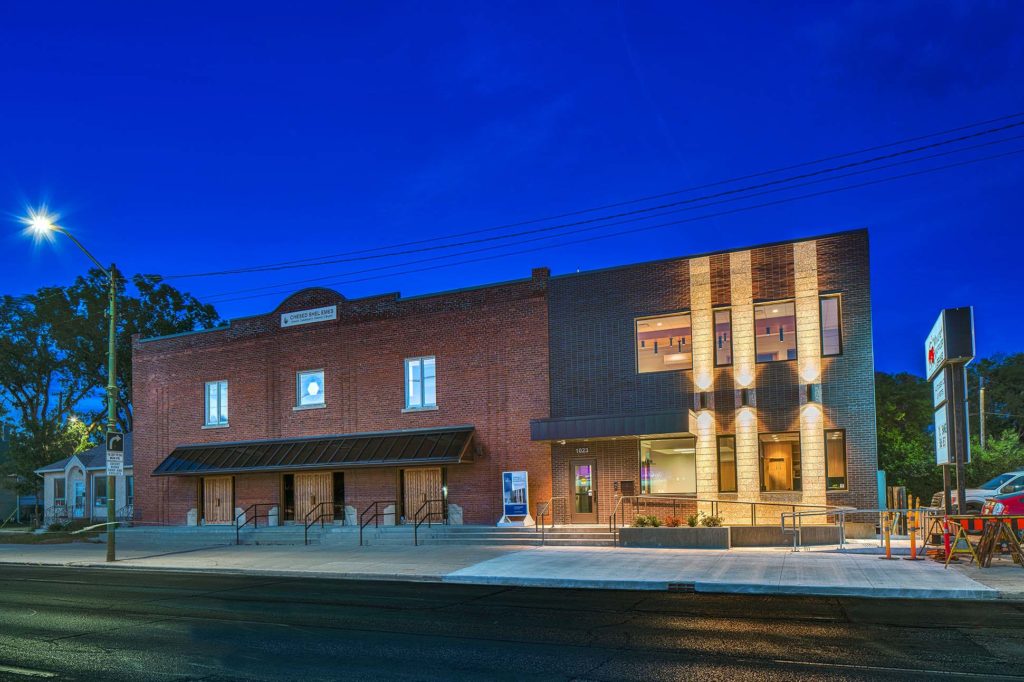Local News
New Jewish Federation of Winnipeg President has strong business, diplomatic background

By MYRON LOVE You might say that community involvement is part of Gustavo Zentner’s DNA.
The new president of the Jewish Federation of Winnipeg – who originally hails from the city of Corrientes in northeastern Argentina – notes that his great-grandfather –
among the earliest Jewish immigrants to the city, was one of the founding members of the organized Jewish community and its cemetery – and his mother was the first (and thus far still the only) female to lead the community.
“My earliest memories are of my mother always chairing meetings of the Federation,” he recalls.
Thus, it is no surprise that Zentner threw himself into volunteering with the Jewish Federation of Winnipeg very soon after he arrived in our community – among the wave of Jews from Argentina who immigrated here 20-25 years ago.
“I was delighted to come to Winnipeg,” the new Federation president says. “I found a warm and welcoming community and was happy to contribute in any way I could.” Zentner adds, “This is a wonderful community and I believe that everyone counts, every person has a story to tell and something to contribute, let’s make sure everyone is part of the conversation”.
As a board member, Zentner has, over the past 15 years, chaired first the Human Resources Committee – followed by the Community Planning, Allocations Committee, and most recently served as Treasurer, chairing the Finance and Audit Committees. He has volunteered with many other organizations; no doubt that experience will serve him well as he builds bridges throughout the community.
In his business career Zentner is the president of InterPOC (International Point of Commerce), an international business consultant, and Honorary Consul of Brazil in Manitoba. Zentner places a lot of emphasis on consultation and planning. “As president, I have asked our board and staff to focus on Hindsight, Oversight, and Foresight: This will help us reflect on our past and values, oversee our community affairs and finances, and have the ability to anticipate future community needs.”
“As president, I am looking forward to taking a more global view rooted on Jewish values and leading through inclusion and diversity as ways of building a closely integrated community. We continue to welcome newcomers to the community from many more regions of the world,” he observes. “We have to reach out to them as well as locally-born youth and strengthen their ties to the community. I also want to encourage more younger members of the community who move elsewhere to complete their education and to come back to Winnipeg to build their professions and lives, raise their families here and contribute to the community.”
“The world is changing rapidly around us and must evolve and change with the times – or we run the risk of losing touch with what people care about most. As the representative body of Winnipeg’s Jewish community, it is up to us to initiate and lead that change with specific care for seniors in our community and those in need of help, whatever that might be”.
Zentner adds that he recently met with Heather Stefanson, our new Premier, to discuss key issues for our local Jewish community. Not surprisingly, immigration was part of the discussion. “We (Stefanson and the Federation) are on the same page with immigration, we want newcomers to integrate throughout our community organization, to bring different cultures, and to add to the professional and economic activities in the province.” he reports.
“I took the opportunity to share with the Premier the important work needed to support seniors and those in need and to advocate for summer camps and youth programs. We are also having discussions about the increasing antisemitism in Canada and in Manitoba, and the need to provide security to our institutions.”
He further spoke of the imperative to continue to reinforce engagement with Israel – a process which the use of modern technology can enhance. Zentner completed leadership training in Israel and visualizes the Federation working more closely with Jewish business and cultural leaders and philanthropists to promote social change through the prism of Jewish values. “Members of our Jewish community – and our Jewish organizations – play important roles in all aspects of society in Manitoba and Israel be it business, health, the arts and philanthropy,” he observes.
With his strong business background, Zentner emphasizes the importance of re-examining governance procedures around the boards of the Federation and its beneficiary agencies, with an eye on preparing for whatever the future may hold.
The new president expresses his appreciation for the support and advice he has received from several of his predecessors, as well as Federation staff.
“These last couple of years have been challenging and hard on many people,” Zentner comments. “I encourage everyone to be mindful of each other. At the Federation, we are working hard to ensure that we have a safe, secure and engaged Jewish community.”
Gustavo is married to Fanny, a lawyer who is also from Argentina. The couple have two daughters, Emma, 18, who, in February of last year, became the first Winnipegger to be elected international president of the BBYO (Bnai Brith Youth Organization) – and 13-year-old Abby, a Grey Academy student, who is preparing for her bat-mitzvah.
Local News
Thank you to the community from the Chesed Shel Emes

We’re delighted to share a major milestone in our Capital Campaign, “Building on our Tradition.” Launched in November 2018, this campaign aimed to replace our outdated facility with a modern space tailored to our unique needs. Our new building is designed with ritual at its core, featuring ample preparation space, Shomer space, and storage, creating a warm and welcoming environment for our community during times of need.
We’re grateful to the nearly 1,000 generous donors who contributed over $4 million towards our new facility. A $750,000 mortgage will be retired in November 2025, completing this monumental project in just seven years.
We’re also thrilled to announce that our Chesed Shel Emes Endowment Fund has grown tenfold, from $15,000 to $150,000, thanks to you, the Jewish Foundation of Manitoba’s FundMatch program, and Million Dollar Match initiative in 2024. Our fund helps ensure that everyone can have a dignified Jewish funeral regardless of financial need.
As we look to the future, our goal remains to ensure the Chevra Kadisha continues to serve our community for generations to come. Our focus now shifts to replenishing our savings account and growing our JFM Endowment fund.
We’re deeply grateful for your support over the past several years.
It’s our privilege to serve our community with care and compassion.
With sincere appreciation,
Campaign cabinet: Hillel Kravetsky, Gerry Pritchard, Stuart Pudavick,
Jack Solomon, and Rena Boroditsky
Murray S. Greenfield, President
Local News
Winnipeg Beach Synagogue about to celebrate 75th anniversary

By BERNIE BELLAN (July 13) In 1950 a group of cottage owners at Winnipeg Beach took it upon themselves to relocate a one-room schoolhouse that was in the Beausejour area to Winnipeg Beach where it became the beach synagogue at the corner of Hazel and Grove.
There it stayed until 1998 when it was moved to its current location at Camp Massad.
On August 2nd members of the synagogue will be holding a 75th anniversary celebration.

As part of the celebration anyone who is a descendant or relative of any of the original members of the first executive committee (as seen in the photo here) is invited to attend the synagogue that morning.
If you are a relative please contact Abe Borzykowski at wpgbeachshule@shaw.ca or aborzykowski@shaw.ca to let Abe know you might be attending or for more information about the 75th anniversary celebration.
We will soon be publishing a story about the history of the beach synagogue, which is something I’ve been writing about for over 25 years.
Local News
Vickar Family cuts ribbon on new Tova Vickar and Family Childcare Centre

By MYRON LOVE In the words of Larry Vickar, the Shaarey Zedek’s successful Dor V’ Dor Campaign “is not only a renewal of the synagogue but truly a renewal movement of Jewish life in our community.”An integral part of that renewal movement was the creation of a daycare centre within the expanded synagogue. On Monday, June 23, Larry and Tova Vickar cut the ribbon, thereby officially opening the Tova Vickar and Family Childcare Centre in the presence of 100 of their family members, friends and other supporters of the project.
The short program preceding the morning ribbon-cutting began with a continental breakfast followed by a welcome by both Fanny Levy, Shaarey Zedek’s Board President, and Executive Director Dr. Rena Secter Elbaze. In Elbaze’s remarks, she noted that Larry and Tova wanted their family (including son Stephen and family, who flew in from Florida) and friends at the event to celebrate the opening of the Tova Vickar and Family Childcare Centre, “not because of the accolades, but because, as Larry put it, he hopes that their investment in the congregation will inspire others to do the same.”
“When Larry and I spoke about what this gift meant to him and the message he wanted people to take away,” she continued, “I couldn’t help but connect it to the teachings of Reb Zalman Schachter-Shalomi whose book – Age-ing to Sage-ing – changes the whole way we look at the concept of ageing and basing it on our ancestral teachings.”
She explained that his concept of “Sage-ing” is based on three key ideas – Discover your meaning and purpose; accept our mortality and think about the legacy you want to leave.
“Larry spoke about these exact concepts when we met,” she said.
Elbaze also noted the presence of Shaarey Zedek’s newly-arrived senior Rabbi Carnie Rose, former Rabbi Alan Green, and area MLAs Mike Moroz and Carla Compton.
Larry Vickar expressed his great appreciation for all those in attendance. “Tova and I are deeply moved to stand here with you today for this important milestone in our community”, he said. “We are grateful to be surrounded by all of you, the people we care about, our family and friends… you who have touched our lives and played some part in our journey.”
